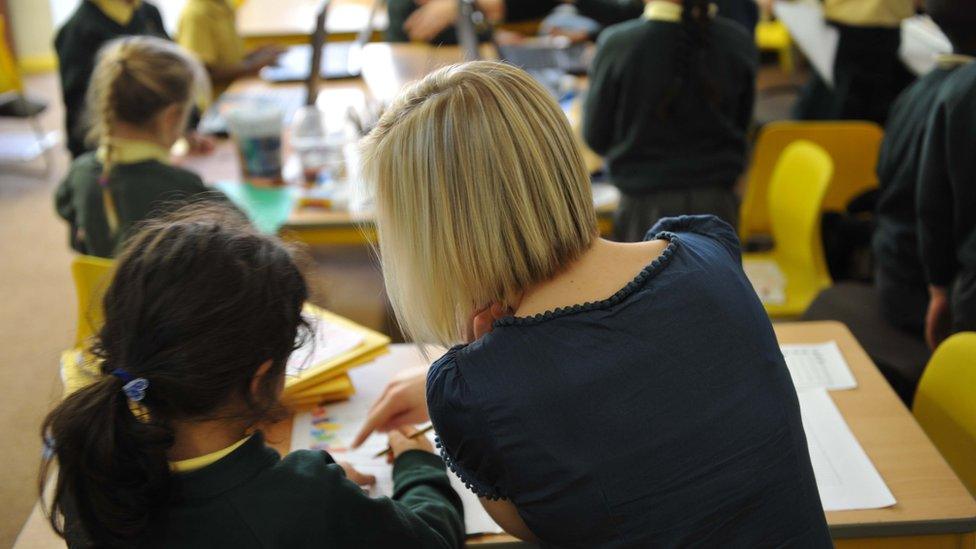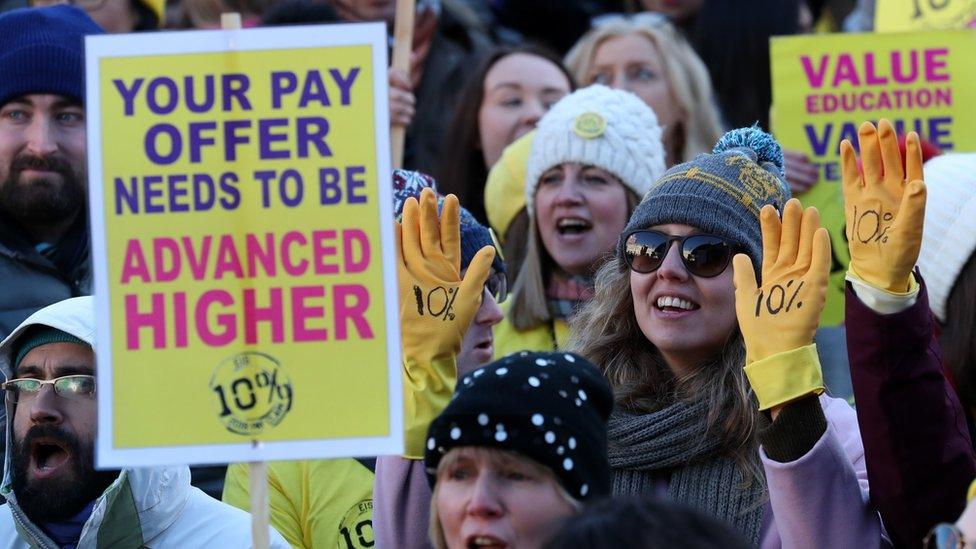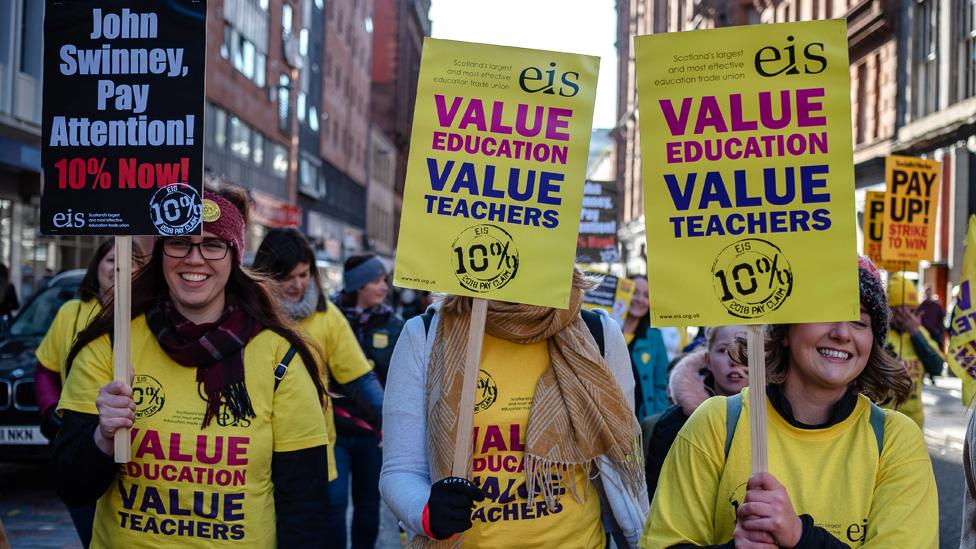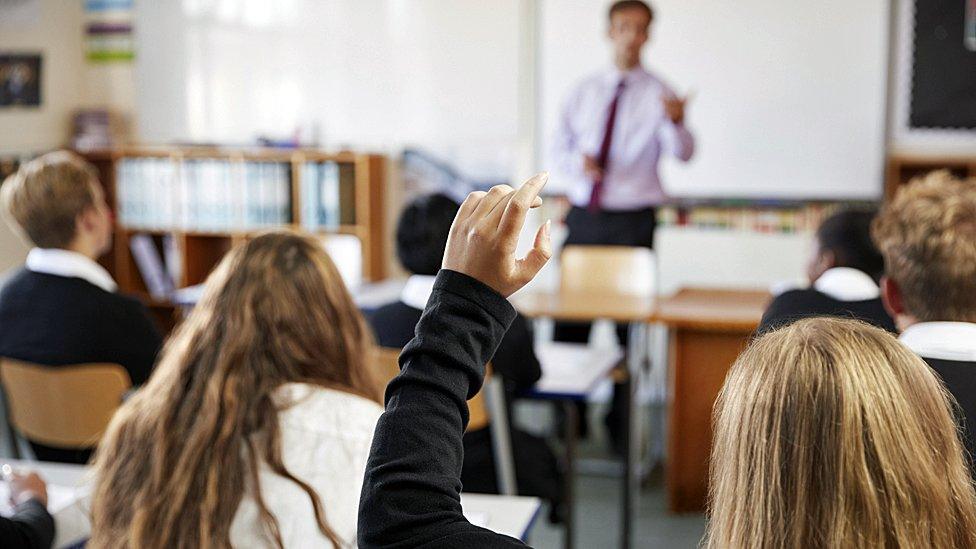No pot of money for teachers' pay deal, says education secretary
- Published

There is no separate pot of money in the education budget to fund an improved pay deal for teachers, the education secretary has said.
Shirley-Anne Somerville said any enhanced offer would have to be paid for by cuts elsewhere.
Scotland's largest teachers' union announced strike action on Thursday after rejecting a 5% pay offer.
Teachers across the country will stage a 24-hour walkout on 24 November with further industrial action planned.
The Conservatives have accused Ms Somerville of being "missing in action" during the teachers' pay dispute and called on her to "get a grip" and resolve the issue.
The education secretary told the BBC's Good Morning Scotland programme that strike action "is not inevitable".
She insisted the Scottish government was "absolutely determined" to work with local authority body Cosla to try to come up with a pay increase closer to the 10% called for by the EIS union.
But she said "difficult decisions would have to be made" because the Scottish government's budgets had already been fully marked out.
Ms Somerville said: "We've made it very clear to teachers, and everyone across the public sector, that we have huge sympathy for public sector workers, with high inflation and the cost of living that we have.
"But we do also have to bear in mind the reality and the context. The Scottish government has a fixed budget. It cannot change taxes in the year. Its reserves have been fully utilised.
"If we're looking to fund public sector pay offers, that money has to come from somewhere else in the budget.
"There is no separate pot of money in the education budget or anywhere else within the Scottish budget to allow these deals to be made."


Ministers have repeatedly said there is no more money for public sector pay deals - that their budget is already spent.
Yet it is clear they intend to find more cash to make an improved offer to teachers to try to avert a national strike.
That appears to mean trimming cash already allocated for other things within the education budget and diverting it to salaries.
While the EIS is seeking a 10% rise - double the 5% currently on offer - they are unlikely to get that when a separate dispute with local government workers was settled at around 7%.
The Scottish government does not seem to be proposing a similar approach in health.
Why? Partly because they have already raided NHS budgets to improve the nurses' pay offer and worry that switching more cash could put patient health at greater risk.
They are also hoping the UK government will come up with some more cash to help resolve this dispute, with the first minister arguing that without it the NHS across the UK is close to breaking point.

Deputy First Minister John Swinney announced £615m of spending cuts in his emergency budget review earlier this month.
It came on top of £560m cuts to public services in September.
Ms Somerville said she was still hopeful a deal could be done with teachers before the first walkout at the end of this month.
She said: "When we met the trade unions yesterday, along with Cosla the employers, there was a clear understanding that no-one wanted to get to the stage where there was industrial action.
"We all appreciate the huge disruption that children and young people have faced over the past few years.
"And that's why, as a Scottish government, we are absolutely determined to see... if there is additional funding that we can provide to Cosla to allow an enhanced pay offer."

Teachers have been calling for a 10% pay rise
The Scottish Conservatives called on the education secretary to "show some leadership" and give education and skills "the priority it needs".
The party's education spokesman Stephen Kerr told Good Morning Scotland: "The Scottish government have had the largest block grant in history.
"The is about political priority and the top priority should be education.
"The Scottish government need to show some flexibility and creativity and solve this dispute.
"We have seen in the past they've been able to find the money when they needed to find the money."
'Real terms pay cut'
EIS general secretary Andrea Bradley said Ms Somerville's comments that the Scottish government was determined to make a new offer were "somewhat positive".
She added: "There has been very little movement since around the third week in September.
"So it is good to hear that the Scottish government is prepared to look again to see how it might be able to provide additional funds in order that Cosla can make a better offer than that 5%, which falls far short of inflation and would amount to an almost 8% real terms pay cut for teachers."
- Published10 November 2022

- Published3 November 2022
